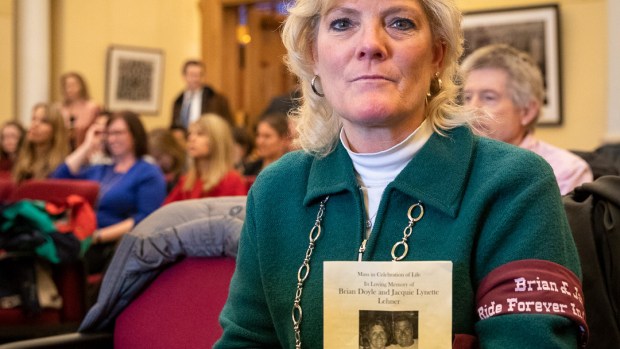
Driving at 75 mph? Why not reach for your phone and have a look at Facebook? Right now it’s legal in Colorado — but that could change if a new distracted driving bill passes in the state legislature.
Yesterday, members of the Colorado Senate Transportation Committee decided to continue negotiating changes to SB19-012, a bill that would ban holding an electronic device while driving. But first, they heard from a few opponents of the bill and more than 25 supporters, including many who told stories of how distracted driving crashes crippled or killed people they love.
“This was not an accident that killed my friends, it was a preventable incident,” said Susan Dane who supports the bill. She and several friends from a motorcycle club founded the advocacy group CORD after a driver reading a text message swerved across a double yellow line and caused the 2016 head-on collision that instantly killed their friends, Brian and Jacquie Lehner.
In the last decade, as smartphones became popular, traffic fatalities have increased at an alarming rate, both across the nation and in Colorado, with many linked to mobile phones. Studies show that most drivers use mobile devices while driving.
Colorado law already bans texting, and people under 18 are not allowed to use a portable electronic device while driving. The new bill would go further by making it illegal for anyone to hold a mobile device while driving. But it’s not an outright ban: Hands-free use could continue, including functions like turn-by-turn driving directions, playing music or talking on the phone.
The proposed law is similar to those that exist already in 16 states, and legislators in 17 other states are considering comparable bills now.
At the hearing, opponents of the bill admitted that distracted driving is a problem, but they argued that this legislation is not the right solution. However most of the people who addressed the committee support the law.
Some supporters said that similar measures in other states seem to work. Many pointed out that people struggle to resist looking at their phones while driving and the practice needlessly injures and kills people. Others added that the public wants action now.
“As much division as there is in this country, there’s no division here,” said Skyler McKinley, public policy director of AAA Colorado. He referenced a nationwide survey of motorists that his organization conducted. “75 percent of all drivers support this type of legislation. Why? Because 90 percent of all drivers believe this is really dangerous. And that’s because it is.”
Distracted drivers caused 57,298 crashes in Colorado between 2012 and 2015, roughly 40 per day, according to an estimate from the Colorado State Patrol. The troopers say that distracted driving caused 67 deaths across the state in 2016. Nationally, 3,450 people died in these kinds of crashes during the same period, according to the National Highway Traffic Safety Administration. But government statistics underestimate the problem.
“According to NHTSA, six percent of drivers were observed using a handheld phone or texting in 2015,” says a report from Zendrive. The company makes software that electronically monitored the driving of 4.5 million people. Their study showed that nearly everyone uses their phones while driving.
“We found that 86 percent of drivers used their phones at least once while behind the wheel.” Those who use their phones while driving spend an average of three minutes and 40 seconds on the devices every hour.”
Several who testified in support of the bill talked about how people can’t resist checking their devices, even while driving at highway speeds. Smartphones deliver dopamine hits, said McKinley. The beeps, vibrations and red-dot notifications coming from mobile devices are known to trigger the release the addictive neurotransmitter.
“Most people know that they have a problem, but they can’t stop,” said Jennifer Smith, CEO of StopDistractions.org in an interview with Streetsblog. “They want the law because it will help them say, ‘Oh it’s against the law, so I can’t do that.’”
The three who opposed the bill raised concerns about how the law might affect poor and marginalized people. It could increase racial profiling, and the consequences proposed are steep, they said. Drivers caught violating the law for the first time would face a $300 fine, four points on their driver’s license, and a class-two misdemeanor charge.
“Do you know how many people languish in jail on their misdemeanors, for their inability to pay the toll to get out on a bond?” asked Denise Maes, public policy director for ACLU of Colorado. “All this does is bloat the misdemeanor justice system even more.”
Advocates countered that similar consequences are already in place to punish people who drive without insurance, and this potentially lifesaving law is even more critical. Laws already on the books give crooked cops plenty of other ways to harass minorities, they added. And unlike many laws that result in a disproportionate number of minority arrests, of the 3,202 people charged under Colorado’s existing texting while driving law, 88 percent were white, according to the State Patrol.
Similar laws appear to be working in other states. In Rhode Island and Oregon, distracted driving went down 19 percent in the month after the regulations took effect, according to TrueMotion, a company similar to Zendrive. In Georgia, drivers texted and used apps 22 percent less in the months after their law went into effect. Traffic fatalities there also declined 14 percent, according to reporting by Bloomberg.
Colorado legislators killed a similar law last year. Yesterday the state Senate Transportation Committee held the bill while its members negotiate changes. The committee will schedule another hearing later in the legislative session — and Susan Dane will be there.
“Why doesn’t this commonsense law already exist?” she said in an interview. “Driving shouldn’t be a multi-tasking activity.”






